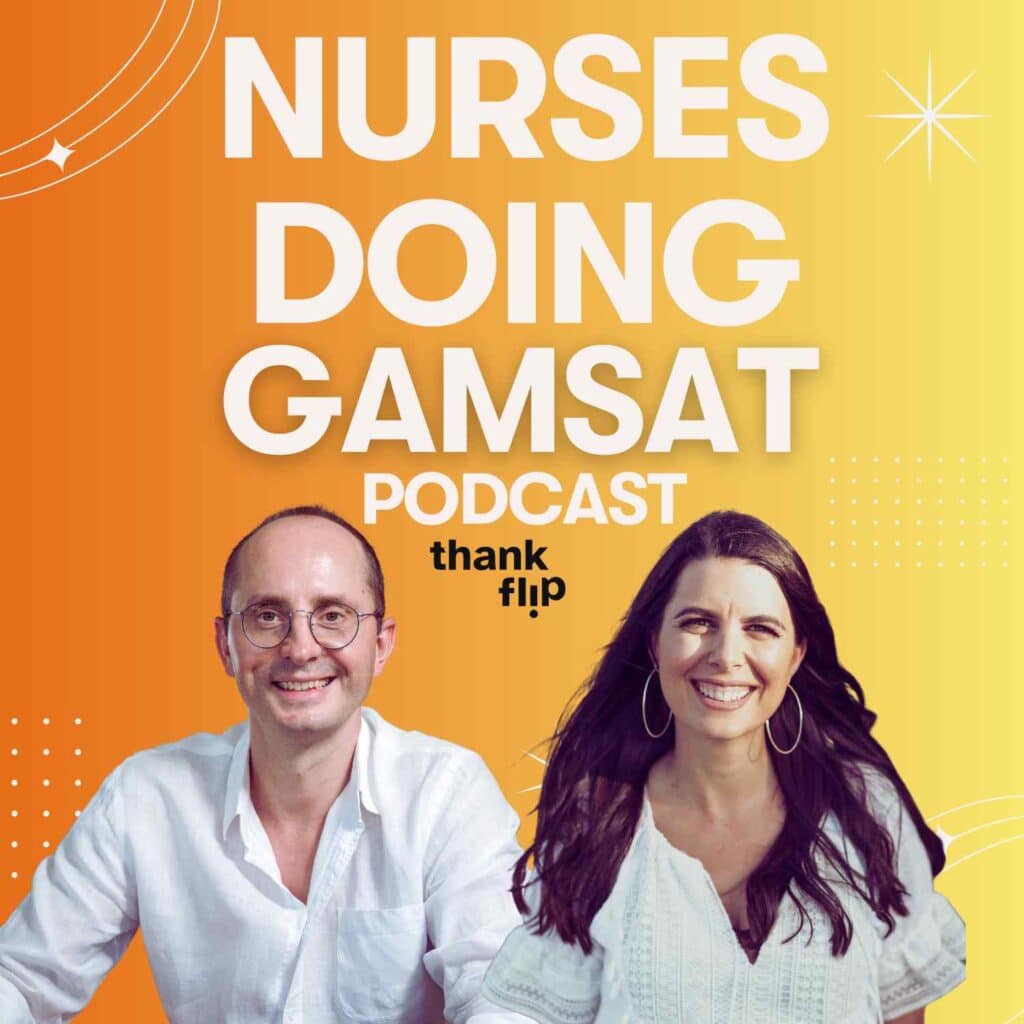In This Episode:
Wondering if there’s still enough time to prepare for the September GAMSAT? You’re not the only one asking. In this solo episode, Mare gives a straight-up, practical answer—explaining how to figure out where you’re starting from, what you need to fix, and how to build a study plan that actually fits your life. If you’re a nurse, healthcare professional, or career changer considering September, this episode is your no-fluff reality check (and game plan). 🚀
Resources Mentioned:
- Episode 3: How To Beat The Science Students At Their Own Game
- Talk to our team about the GAMSAT Bootcamp program
- Join our Nurses Doing GAMSAT Facebook group for any questions
Hey, it’s your girl Mare here. I’m excited for another episode of Nurses Doing GAMSAT. Today, I’m going to focus on one question, and one question alone—and it’s the one I’ve been asked about 55,000 times this week:
“Is there enough time for me to prepare for September?”
Now, there are many versions of this question. Things like:
“Am I crazy to register now?”
“Am I going to have enough time to prep?”
“What can I do to get started?”
All of these are really the same question in disguise. So I’m going to tackle that in today’s episode. It’s going to be a solo one—just me today, which is very exciting! Well, I say solo, but of course my cat is here—as with most episodes. Hopefully, she’s not a menace today.
So let’s dive straight in: Do you have enough time for September?
You are the only person who can truly answer that, but I’m going to help you figure it out—so you can decide for yourself if you personally have enough time.
Because it depends on how far down the rabbit hole you need to go with your study.
Just like any other time of year, when you start studying, you don’t want to just go willy-nilly and say, “I think I need to do some science,” and then just pluck a topic out of thin air and start Googling it.
That’s not how this works.
I want you to think about your study like planning a holiday. Imagine you’re in Bangkok, staying at the Hilton, and you want to go to the Bangkok markets. What do you do? You open Google Maps, right? You type in your current location and your destination—“Hilton” and “Bangkok markets.”
And then Google gives you the most direct route.
You don’t just start walking in a random direction saying, “I hope I make it before the markets close,” while crossing your fingers for a fake designer handbag or whatever you’re after.
It’s the same thing with GAMSAT.
In that analogy, you’d be crazy to just walk in any direction without a map. So yes, it’s a good question to ask, “Will I have enough time?” But the real question should be:
Where am I now?
Where do I want to go?
And how do I get there efficiently?
Let’s use Section 3 as an example. Ask yourself:
“What’s my current level of knowledge in the basic sciences—physics, chemistry, biology?”
That’s probably only 20% of what you need.
More importantly:
“What’s the state of my skills?”
“What am I good at? What am I not good at?”
You need to write all of that down and then ask:
“What are the exact actions I’m going to take to build those skills?”
I’ll reference you to Episode 3 of this podcast. If you don’t know how to build a skill, go listen to that episode—it gives you a step-by-step guide.
From there, you’re going to list everything you need to do to build those one dozen, two dozen, however many dozen skills you need to work on.
Only then do you open your diary and say, “OK, I can study 10 hours a week, 15 hours a week, 20 hours a week,” and then start mapping those tasks into the available time you have.
Maybe you’re on uni break and have 30 hours a week right now. But when uni starts again, you might only have 10 or 15 hours. You want to plan accordingly.
Once you’ve linked your available hours with your skill-building actions—voilà! You’ll know whether or not you have enough time.
Now, here’s the thing most people don’t realise: starting now—no matter when “now” is—is never too early.
Whether you’re sitting September, March, or even just thinking about the GAMSAT… starting now is always a good move. It is literally impossible to start too early.
But you need to understand: skill acquisition is very different to knowledge acquisition.
Let me explain.
I learnt to drive a manual car about 20 years ago. I drove one for maybe 7 or 10 years, but I don’t anymore. Still, it’s a skill that’s embedded in me because I did it over and over. I might not be able to explain how to do it now, but if you throw me the keys to a manual car, my body knows what to do.
That’s the power of skill.
Same with riding a bike. You might not have ridden in two years, but if you learnt properly as a kid, you get on—and your body remembers.
That’s not the same as cramming facts.
With GAMSAT, you’re building skills. So the earlier you start, the more time you have to lock those skills in deeply.
Even if you just start by mapping out what skills you need to build, how you’re going to build them, and assigning a few hours each week—you’re going to be way ahead.
Because most people? They deep dive without a plan. They start Googling randomly. No map. No destination.
They’re just walking the streets of Bangkok hoping to stumble across the markets before sundown.
And honestly, I’ve spoken to thousands of students over the past 18 years. The ones who take that approach? Most don’t get there before sundown—figuratively speaking. They usually don’t get the result they want.
Why? Because they didn’t use their time efficiently.
And look—no one wants to spend more time studying for GAMSAT than they absolutely have to, right? This isn’t exactly a beach holiday. So let’s use the hours we have wisely.
Now—if you’ve already registered for September and haven’t started studying yet—this is your wake-up call.
What are you waiting for?
Don’t ask, “Do I have enough time?” Just dive in and use this strategy.
If you haven’t registered yet and you’re on the fence, then this weekend I want you to:
Figure out what you need to fix.
Figure out how you’re going to fix it.
Then ask yourself: Do I have the time to fix it, alongside the rest of my life—uni, work, family, cooking, laundry, whatever?
And if the answer is no—don’t freak out.
It just means we stretch the same amount of work over a longer time frame—say, from now until March. That means fewer hours per week, less stress, and more consistency.
So I hope that was really helpful for you today. It’s a short one, because I wanted to laser in on just this one question.
If you have any other questions you’d love me to answer, send them in! You can DM us on socials or email us via the website.
And if this was helpful—let us know! We love reviews and hearing from you.
Until next week—go study. You’ve got this.
Bye for now!
Watch Now on YouTube:
Ready to Make This GAMSAT Your Last? Book a FREE 1-on-1 Call Now!
Before You Go — Get Your Freebie!
Click here download The GAMSAT Manifesto — our free GAMSAT study guide that has (so far) helped more than 60,000 people crush this highly unusual exam. Oh yeah, and did we mention…it’s free?



